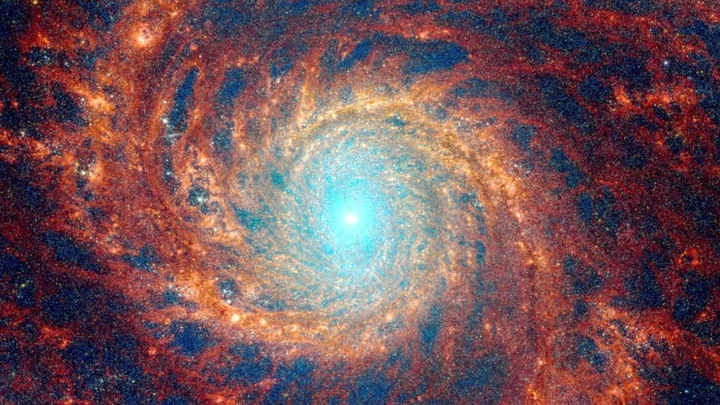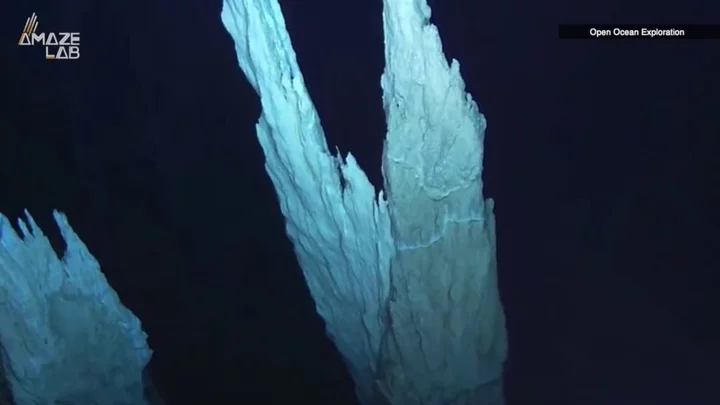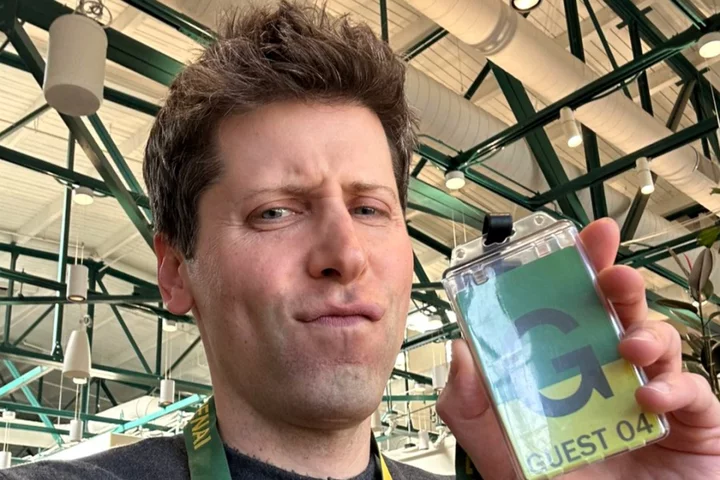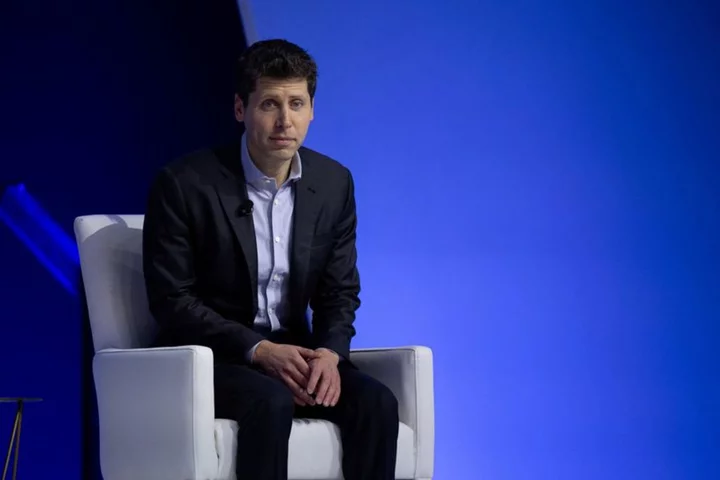
Explainer-GM-owned Cruise's wrong turn could slow robotaxi push
U.S. robotaxi operators could face increased regulatory scrutiny after an accident involving Cruise, the self-driving cab business of
2023-11-21 01:51

Crypto firm Tether says it has frozen $225 million linked to human trafficking
By Elizabeth Howcroft LONDON Crypto firm Tether said on Monday that it had frozen $225 million worth of
2023-11-21 00:23

Doctor shares 6 signs that you might be a borderline alcoholic
Are you questioning your relationship with alcohol? Or perhaps you're concerned about someone in your life? Dr. Dave Nichols - an NHS GP - shared six signs that you may be a "borderline alcoholic" to help you know if it's time to stop. Dr. Nichols spoke to The Sun about what makes someone "dangerously close to the line" of drinking too much. "A lot of people know that they sometimes drink too much, but many don't know where the line is when it comes to problematic alcohol consumption," Dr. Nichols explained. "It describes a pattern of harmful drinking where you may have a drink, or several drinks, every day or regularly binge drink." To help people gain a better understanding of their drinking habits, he shared six signs to look out for: drinking alcohol every day without realising it; binge drinking often; only socialising if alcohol is involved; drinking frequently during the day; finding it irritating when others are not drinking; and consuming more than the recommended government guidelines. The NHS recommends drinking no more than 14 units spread across three days or more. Which equates to roughly six medium (175ml) glasses of wine, or six pints of 4 per cent beer. Dr Nichols warns that borderline alcoholics are at risk of falling into dependence: "While you may not yet have developed a physical dependence to this pattern of drinking, you are at high risk of developing alcohol dependence. "Borderline alcoholics might experience symptoms such as abdominal pain, stress, anxiety, bad skin, trouble sleeping, irritability and higher blood pressure." If you're looking to cut back on your alcohol consumption, events such as Dry January are a great way to kickstart habits. Dr Nichols also suggested socialising in sober settings, such as exercise classes, dog walks, or coffee shops. If you are worried about your alcohol consumption find a list of NHS resources here. Sign up to our free Indy100 weekly newsletter Have your say in our news democracy. Click the upvote icon at the top of the page to help raise this article through the indy100 rankings. How to join the indy100's free WhatsApp channel
2023-11-21 00:20

U.S. senators announce subpoenas to Discord, Snap, X CEOs on child sexual exploitation
WASHINGTON U.S. Senators Dick Durbin and Lindsey Graham said on Monday that subpoenas have been issued to the
2023-11-21 00:19

Scientists say you don't need to be religious to have a 'moral compass'
Scientists have decided it’s official – people do not necessarily have to believe in a “god” to have a moral compass. A group of four University of Illinois surveys found that while there were subtle differences in behaviour between groups of atheists and religious people – or “theists” – they live by the same moral codes. Tomas Ståhl of the University of Illinois said: “The most general take-home message from these studies is that people who do not believe in God do have a moral compass. "In fact, they share many of the same moral concerns that religious believers have, such as concerns about fairness, and about protecting vulnerable individuals from harm.” The first two surveys crowdsourced responses from hundreds of American residents, and found that religion was unrelated to amoral tendencies, whether people would endorse liberty or oppression or whether people cared about being fair to others. The second two surveys compared thousands of people across the US and Sweden, which is a much more secular country. The data came up with the same results. Mainstream religions are on a downward trend worldwide. In the UK, for example, just 46 percent of people identified as Christian in the 2021 census, compared to 59 percent in 2011. The US has seen similar declines. Ståhl added: “However, disbelievers are less inclined than believers to endorse moral values that serve group cohesion, such as having respect for authorities, ingroup loyalty, and sanctity… “It is possible that the negative stereotype of atheists as immoral may stem in part from the fact that they are less inclined than religious people to view respect for authority, ingroup loyalty, and sanctity as relevant for morality, and they are more likely to make moral judgments about harm on a consequentialist, case by case basis.” It’s news that will come as little surprise to the estimated 750 million atheists across the globe, of course. But for people who still think religion is the key to morality, it could be food for thought. How to join the indy100's free WhatsApp channel Sign up to our free indy100 weekly newsletter Have your say in our news democracy. Click the upvote icon at the top of the page to help raise this article through the indy100 rankings.
2023-11-20 23:16

OpenAI staff threaten to quit unless board resigns - letter
By Akash Sriram OpenAI's staff has threatened to quit the artificial intelligence startup and join former boss Sam
2023-11-20 22:26

How the Tesla Cybertruck’s Price and Range Will Determine Its Fate
When Tesla Inc. starts delivering Cybertrucks to customers next week, it will answer a question with major implications
2023-11-20 21:24

Factbox-Who is OpenAI's interim CEO Emmett Shear?
(Reuters) -ChatGPT-maker OpenAI has named ex-Twitch boss Emmett Shear as its interim chief executive officer after the startup ousted former
2023-11-20 19:16

Scientists discover fluffy 'alien' planet where it rains sand
Experts have discovered a fluffy “alien” planet where it rains sand in stunning new observations from the James Webb Space Telescope. The bizarre-looking planet is officially known as exoplanet WASP-107b and has a cloud of silicate sand that exists high within its atmosphere giving it its strange fluffy appearance. NASA’s James Webb Space Telescope (JWST) has been responsible for some astounding findings since it was launched in 2021, including a mysterious galaxy shaped like a question mark. Now, observations made by the telescope have been used by experts who have been able to determine the atmospheric composition of the exoplanet that was pictured. A team of European astronomers found that water vapour, sulfur dioxide and silicate sand clouds existed in the exoplanet’s diverse atmosphere. The exoplanet WASP-107b is one of the lowest-density planets that astronomers are aware of. To put it into context, it is the same size as Jupiter, but has just 12 per cent of Jupiter’s mass. Thanks to its low density, it has allowed scientists to take a deeper look into the planet’s atmosphere, exploring 50 times deeper than would be possible with denser planets. The discovery of sulfur dioxide was a surprise because the host star it orbits only emits a small amount of high-energy light photons. But, its low-density atmosphere allows the photons to penetrate WASP-107b’s atmosphere where the chemical reaction that creates sulfur dioxide can occur. They also discovered that it essentially rains sand on the exoplanet due to the presence of clouds high in the atmosphere made up of fine silicate particles. Experts believe the clouds of sand form in the same way as rain does on Earth as the droplets continually fall and condense back into cloud form. The lead author of the study, Leen Decin from Katholieke Universiteit Leuven in Belgium, explained: “JWST is revolutionizing exoplanet characterisation, providing unprecedented insights at remarkable speed.” She added: “The discovery of clouds of sand, water, and sulfur dioxide on this fluffy exoplanet… is a pivotal milestone. It reshapes our understanding of planetary formation and evolution, shedding new light on our own solar system.” How to join the indy100's free WhatsApp channel Sign up to our free indy100 weekly newsletter Have your say in our news democracy. Click the upvote icon at the top of the page to help raise this article through the indy100 rankings.
2023-11-20 18:17

'Lost City' deep in the Atlantic is like nothing else we've ever seen on Earth
The reality of what lies within our oceans has fascinated people since time immemorial, so it’s no wonder we’ve created countless myths about the watery depths. But step aside, Atlantis, scientists have discovered a real Lost City beneath the waves, and this one is teaming with life. The rocky, towering landscape is located west of the Mid-Atlantic Ridge mountain range, hundreds of metres below the surface of the Atlantic Ocean, and consists of massive walls, columns and monoliths stretching more than 60 metres (200ft) tall. To be clear, it’s not the home of some long-forgotten human civilisation, but that doesn’t make its existence any less significant. The hydrothermal field, dubbed the “Lost City” upon its discovery in the year 2000, is the longest-lived venting environment known in the ocean, Science Alert reports. Nothing else like it has ever been found on Earth, and experts think it could offer an insight into ecosystems that could exist elsewhere in the universe. For more than 120,000 years, snails, crustaceans and microbial communities have fed off the field’s vents, which spout out hydrogen, methane and other dissolved gases into the surrounding water. Despite the absence of oxygen down there, larger animals also survive in this extreme environment, including crabs, shrimps and eels. Although, they are, admittedly, rare. The hydrocarbons produced by its vents were not created by sunlight or carbon dioxide, but by chemical reactions way down on the seafloor. This is how life on our planet may have originated some 3.7 billion years, and how it could be formed on others. "This is an example of a type of ecosystem that could be active on Enceladus or Europa right this second," microbiologist William Brazelton told The Smithsonian back in 2018, referring to the moons of Saturn and Jupiter respectively. "And maybe Mars in the past." The tallest of the Lost City’s monoliths has been named Poseidon, after the Greek god of the sea, and it measures more than 60 metres high. Meanwhile, just northeast of the tower, is a cliffside where the vents “weep” with fluid, producing "clusters of delicate, multi-pronged carbonate growths that extend outward like the fingers of upturned hands", according to researchers at the University of Washington. There are now calls for the Lost City to be listed as a World Heritage site to protect the natural phenomenon, particularly given humans’ propensity to destroy precious ecosystems. Back in 2018, it was confirmed that Poland had won the rights to mine the deep sea around the thermal field. And whilst, in theory, the Lost City would not be touched by such works, as Science Alert notes, the destruction of its surroundings could have unintended consequences. Sign up for our free Indy100 weekly newsletter Have your say in our news democracy. Click the upvote icon at the top of the page to help raise this article through the indy100 rankings
2023-11-20 17:45

Microsoft hires ousted OpenAI boss Sam Altman
Microsoft has hired OpenAI co-founder and former chief executive Sam Altman just days after he was ousted from his company. Mr Altman was fired on Friday, less than a year after launching the hugely successful AI chatbot ChatGPT, with OpenAI’s board saying it “no longer has confidence in his ability to continue leading OpenAI”. Microsoft CEO Satya Nadella was reportedly “furious” about being blindsided by Mr Altman’s firing, despite the tech giant being a key investor of the artificial intelligence firm. On Monday, Mr Nadella announced that both Mr Altman and fellow OpenAI co-founder Greg Brockman would be joining his company. “We’re extremely excited to share the news that Sam Altman and Greg Brockman, together with colleagues, will be joining Microsoft to lead a new advanced AI research team,” Mr Nadella wrote on X, formerly Twitter. “We look forward to moving quickly to provide them with the resources needed for their success.” Mr Altman replied to the post: “The mission continues.” Mr Altman had previously posted a picture of himself wearing an OpenAI guest pass over the weekend, together with the caption: “First and last time I ever wear one of these.” Mr Nadella followed up his original post on X with further details about what Mr Altman’s new role might be within the company. “I’m super excited to have you join as CEO of this new group, Sam, setting a new pace for innovation,” he wrote. “We’ve learned a lot over the years about how to give founders and innovators space to build independent identities and cultures within Microsoft, including GitHub, Mojang Studios, and LinkedIn, and I’m looking forward to having you do the same.” Read More OpenAI in talks to bring Sam Altman back days after CEO ouster, reports say OpenAI co-founder Sam Altman ousted as CEO ChatGPT Plus stops signups after major update ChatGPT creator mocks Elon Musk in brutal tweet ChatGPT goes offline ChatGPT update allows anyone to make their own personalised AI assistant
2023-11-20 17:19

Sam Altman will not return as CEO of OpenAI - The Information
Sam Altman will not return as CEO of OpenAI despite efforts from the company's executives to bring him
2023-11-20 13:18
